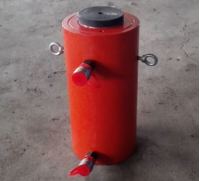Some support lifting tasks have very strict requirements for the accuracy of their lifting height, so when faced with such work, we tend to choose hydraulic jacks rather than screw jacks. It is generally believed that hydraulic jacks have more precise fine-tuning capabilities, mainly because the working principle of hydraulic systems gives them some advantages, which mainly include the following aspects.

① Hydraulic transmission system: Hydraulic jacks use liquid as the transmission medium to provide lifting force through pressure transmission. Compared to mechanical jacks, liquid transfer can provide force more smoothly and continuously, making fine-tuning more precise.
② Precision control: Hydraulic systems can achieve precise control by adjusting the pressure of the fluid. Small adjustments can produce precise lifting or pulling movements, so using a hydraulic jack makes it easier to make small height adjustments, which is important for certain applications such as precise placement or unloading of heavy objects.
③ Stability: Due to the fact that liquids are not easily compressed, hydraulic jacks perform well in providing stable and uniform force. This means that instability or sudden loss of control is less likely to occur during the lifting or lowering process of the jack, making fine-tuning more reliable.
The more precise fine-tuning of hydraulic jacks is mainly due to their use of hydraulic transmission systems, which can provide smooth, accurate, and controllable lifting force, suitable for various application scenarios that require high-precision fine-tuning. If you want to learn more, feel free to consult us at any time.
Tag:
2025-11-26
2025-11-26
2025-11-26
2025-11-19
2025-11-19
2025-11-19
2025-11-12
2025-11-12
2025-11-12
2025-11-05